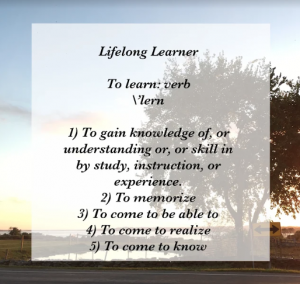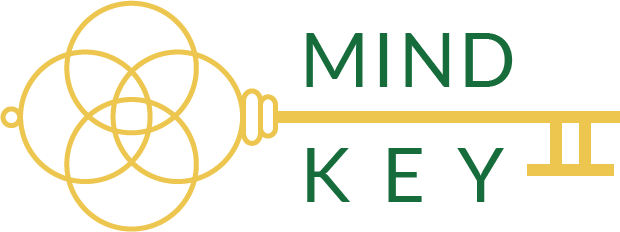
In this issue: An introduction to Lifelong learner
By Catherine Minto
Over the duration of our lives, we come to know what we know through the pursuit of applied academia, or the raw experience of our personal journey through life. We learn through trials, tribulations, and triumphs. Failures teaches us as much, if not more than our successes. Lifelong learning guides us through the endless undulations of the experience that is life.
One of the greatest advantages of living in this age is our ability to access and absorb millions of volumes of information. We can gobble it up and literally run with it in our pockets. Being a lifelong learner is so much more than information, however. It’s a free-spirited journey of the soul to remember that life is short, but that we have the ability to take in everything around us whenever we choose.
Defining lifelong learning
What does it mean to be a lifelong learner? According to Merriam Webster, “learn” is a verb that means “to gain knowledge of, understanding of, or skill in, by study, instruction or experience.” It also can mean, “to memorize,” and “to come to be able to, realize or know.

Being a lifelong learner can mean anything from returning to academia as an adult, choosing a dramatic career change, attending the school of life and taking deep learning from your experiences, or discovering or rediscovering yourself through experiences. This includes taking on a passion project, going back to school or discovering a curiosity for something that you never noticed before. Lifelong learning also means learning from our mistakes, and taking a different perspective when approaching situations. This speaks to the act of putting ourselves in someone else’s shoes, or even seeing seeing a situation through a different aspect of self (like taking off our business hat and considering clients or employees as one might consider a friend in order to get the perspective needed to resolve a situation).
Lifelong learning is not simply one modality. It encompasses everything that life has to offer, including academics, self-exploration, life experiences, relationships and so much more.
Lifelong learning in academia
Commitment to academic study brings opportunity for furthering careers, an understanding of how things work in the world through science, history, politics, fine arts, design, and so much more. These days, you can go to school for anything your heart or mind desires, at any age. You can do it for passion, for financial or career growth, to expand your skills, or to pursue research that will better humanity. We can go back to school for a greater conceptual understanding of how things work in the world, or to enrich ourselves.
Learning through experience
The route of self-study is comprised of the culmination of our experiences that keep us learning throughout our lives. These experiences help us learn a little more about ourselves and who we become as a result. It is through experience, not study, that we learn the nature of our character, and the texture of our emotional, physical, and spiritual being. Relationships, jobs, adventures, big moves, little moves, creative endeavors, spiritual awakenings and financial successes/hardships are life experiences that help us discover our preferences, our best-suited environments, and our personal style in communication, work, and expression of self. We come to know ourselves and our environment by engaging in life and witnessing experiences as they unfold.
Learning through examination
Life is a succession of lessons which must be lived to be understood.
~Ralph Waldo Emerson
Lifelong learning means so much more than learning something new. It also means continually reexamining things you’ve already learned or experienced as a constantly evolving human. Our responses to situations shift and change as we move through different stages of our life. What happened to us as children takes on a different color when looked at through the lens of parenthood.
Perhaps we could have called the issue “Self-examination” and included a discussion of how learning helps us do that. Either way, both the process of learning and that of self-examination clearly go hand-in-hand.
In this issue
In this issue, we will explore the emotion of love, as well as other emotional experiences as teachers. We will discuss the benefits of lifelong learning, as well as how they apply to neuroplasticity and aging. We’ll explore the process of learning from life experiences and relationships through research as well as personal anecdotes. With any luck, we’ll also be able to share with you some great places—both online and in the physical world—that can help us better learn about ourselves and the world around us.
This issue will also launch our series on the chakra system. Each month, we will highlight one chakra, discussing the different aspects of each chakra, how it connects with the body, and ways we can connect with and bring more vitality to those parts. This month’s contribution to the chakra series will introduce the chakra system and its role as teacher and healer for our bodies. The body, after all, is our greatest teacher.
Lifelong learning with Mind Key
We consider Mind Key and The Daily Key a place for learning. Our goal is to provide not only resources, but also the tools to understand those resources and to fully understand how and why they might be right for you. We arrange everything we do in an effort to help you better learn and hone your own internal guidance system. This is because we believe that you are your own best expert when it comes to determining your best resources for personal healing and growth.



 “Once you stop learning, you start dying” Albert Einstein
“Once you stop learning, you start dying” Albert Einstein  “Once you stop learning, you start dying” Albert Einstein
“Once you stop learning, you start dying” Albert Einstein